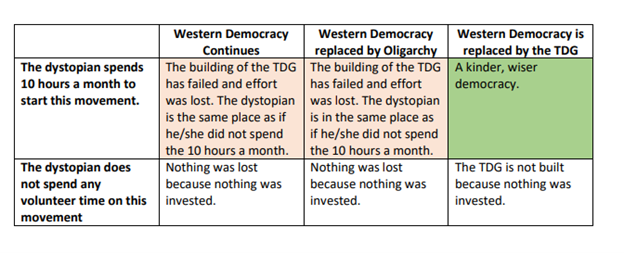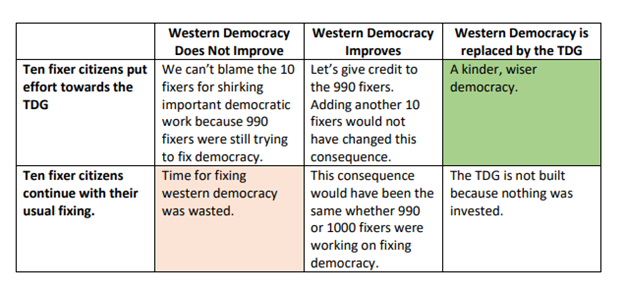Pascal’s Wager is a Renaissance philosophical treatise on why a person should believe in God. It is based on the premise that a good place in the afterlife depends on belief of God in this life. Here is a table of the consequences of Pascal’s Wager:

There are four consequences. One is very positive. One is very negative. One is slightly negative. The last is neutral. If we are to gain the positive consequence, then the logical choice is to believe in God. If we go in that direction, the “wasted effort” if God does not exist is very small compared between the reward for believing and the punishment for not believing. So, with this logic, it becomes a no-brainer to believe in God.
Of course, this whole logic falls apart because an all-knowing God would know if a non-believer was faking his belief. Fakers would burn in hell no matter how many times they attended church or tried to be good when they really wanted to be bad.
So what was Pascal really trying to teach us?
Some commentators have suggested that Pascal was trying to teach the people of his day about probabilities. Let’s look more carefully at the table.
At the top, there are two possible outcomes. Despite both ardent theists and ardent atheists claiming they already know the actual outcome, there really hasn’t been any conclusive scientific proof of one way or the other. So a curious open-minded person should approach the question “Does God Exist?” with both outcomes as being possible. And note that these outcomes are independent of whatever the person says, does, or believes: God exists or not!
The person’s involvement comes into the left column. In Pascal’s Wager, the person has two choices: 1) Believe in God or 2) Not believe in God.
So what we now have is a 2 x 2 matrix. When an outcome intersects with a choice, we have a consequence for that outcome/choice. Rather than arguing for one outcome or the other, we have four consequences that can be collectively evaluated to lead us to a positive decision. So simple, but so brilliant.
I will bring a similar logic to this essay about changing our current western democracy.
Tiered Democratic Governance
For 24 years, I have been working on an alternative version of democracy called “Tiered Democratic Governance (TDG).” This concept was inspired by my six years in a Canadian political party where I experienced a lot of dysfunction. Somehow, I invented the TDG, which addresses all this dysfunction.
I will just provide a little background to describe this TDG. First, the TDG gets rid of all political parties. Second, the electoral districts will be much smaller—maybe 200 residents. Third, voters will be trained to vote for character and competence. Fourth, this election happens once a year. Fifth, this TDG has to develop a new culture of decision making called “consultation.” Building this TDG—I will claim—will result in a wiser, kinder democracy than we have today.
Because this description really doesn’t explain the TDG very fully, I can already hear the hollers: “This Dave Volek fellow is only another utopian with lofty ideals that will never work. And it is obvious he is only trying to flog his book.” Please stay with me a little longer.
Pascal’s Wager for the Dystopian
Let’s look at a citizen who has the following attributes:
· He/She wants a better world for their children and grandchildren and all other world citizens.
· He/She believes that western democracy is failing.
· He/She believes that western democracy cannot be fixed.
· He/She believes that western democracy will eventually transition into some version of oligarchy.
· He/She believes that this oligarchy will benefit neither his/her demographic nor society-at-large.
· He/She will not work toward a cause that could prevent this oligarchy because the oligarchy is inevitable and the effort would be wasted.
· He/She has found the TDG and finds it interesting. There are no other movements with a similar promise.
I will call this person a dystopian. It makes no immediate sense for a dystopian to build the TDG. They might as well pull up their lawnchairs, sit on the riverbank, drink iced tea, watch the ship sink, and hope the new way won’t be so bad.
But here is what the TDG asks of its early builders: about 10 hours a month of volunteer time. To put this in perspective, 10 hours a month is foregoing about four movies or sporting events.
Now, let’s bring in Pascal’s Wager.
First we set up our outcomes. Even though the dystopian believes that western democracy is heading for an oligarchy, no one really knows for sure. There are three possible outcomes: 1) Democracy will bumble along in the next 50 years as it has in the past 50 years, 2) Democracy is replaced by an oligarchy, and 3) the TDG eventually replaces the western democracy.
Then we set up the decision the dystopian has to make: “Should I spend that 10 hours a month to build the early TDG?”.
Now we can now build our Pascal’s Wager table. This one is a 2 x 3 matrix.

Let’s look at the consequences. We have one extremely positive consequence. We don’t have any significantly bad consequence in this Pascal’s Wager. And we have two slightly negative consequences in that the dystopian has lost those 10 hours a month trying to build the failing TDG.
So the citizens who see a dystopia on the horizon have to weigh the prospect of a better democracy against losing those 10 hours a month.
Here’s another way to put this Pascal’s Wager: “If the transition from democracy to oligarchy is likely, why not put in the time to see if the TDG can turn this outcome around?”
Pascal’s Wager for the Fixer
Now I am going to apply Pascal’s Wager to a different kind of citizen, which I call the “fixer.” This fixer believes a better world is possible. But this citizen believes that western democracy can be repaired. He/she is willing to play a bigger democratic role than voting once every few years.
This bigger role can take one of three paths. First, the fixer can join a political party and gain an active role in the back rooms. Maybe the fixer’s value system will shape the party’s value system in a small way, especially if more similar fixers join the party. Second, the fixer can become an activist, trying to bend the will of those ambitious people who aspire for public office. And last, the fixer can spend time on the internet espousing his/her views, hoping that a few minds will be changed toward the fixer’s superior intellect.
Before I go further with this Pascal’s Wager, I should point out that all three of these fixing paths will likely cost more than 10 hours a month. There is a reason for the term “political junkies.”
Now to continue. Let’s assume that we have 1,000 fixers. Ten of them have discovered the TDG and found it interesting and worthy of consideration. They are considering pulling volunteer time away from fixing western democracy and putting it toward the TDG. Here is their Pascal’s Wager:

Again, we have one big positive consequence to be weighed against one slightly negative consequence.
The neutral consequences in the second row are neutral because the fixer was going to put in at least 10 hours a month anyways. Does it matter if he was fixing western democracy or building the TDG? So the fixer’s redirected efforts should not be considered a loss.
So where should those 10 fixers, who are somewhat interested in the TDG, put their time into? Where is the positive consequence? Logic says that fixers should put their time into the TDG and let the other 990 fixers carry on with the fixing democracy work.
It really doesn’t matter whether the 990 can improve democracy or the other 10 can actually build the TDG. Somebody has to try out this TDG to know if it will work.
Let’s put this in another way. Even if the fixer believes fixing western democracy is more important than building the TDG, that fixer should put effort into the TDG because there are still many more fixers trying to fix the current version of western democracy than fixers who decided to build the TDG.
Assigning Probabilities
I’ve discussed the TDG with at least 1000 people on the internet. I get a lot of “It’s impossible to build a new system.” What these people have done is to have quickly assigned a 0% chance of success for the TDG. But are they really that smart? How has their record of political fortune telling really turned out?
In 1688, they would have been the ones to say: “This democracy thing can’t work in England.” Or in 1787, they would have said: “This document cannot unite the 13 states.” Or they would have derided the new political institutions created in Europe after WW2: “Europeans have always been at war.”
The British Parliament and U.S. Congress have proven to last a long time. European parliaments are approaching a century. But at their inception, there was never a 100% chance of success for any of these institutions. Their supporters at that time just worked to make these institutions succeed, guided by democratic principles. These supporters were not listening to the naysayers. The TDG will be built in the same way.
One statistical application that I use to help sort out probabilities in my mind is: “What is the break-even probability?”
For example, I’m pretty sure that if I could prove to both dystopians and fixers that there is a 100% chance of success that the TDG would create that “kinder, wiser democracy,” enough of them would find that 10 hours a month to build the TDG. They really want a better world.
But what about a 90% chance of success? What about 80%? At what probability does the dystopian or fixer say: “It does not make sense to put my spare time into this TDG”?
Let’s take that chance of success down to 10%! A 10% chance of success of moving the world forward with this wiser, kinder democracy—against, against, against, against—what?—just 10 hours a month! For a year or two!
The interesting part of this time investment is that the dystopian or fixer should start seeing some positive results after a couple of years of volunteering for the TDG. They just might say: “Maybe this TDG will work out after all. My TDG time has given me a look into the future. Humanity is capable of finishing this task. I’m glad I forewent all those movies and sporting events and political meetings.”
Conclusion
The two Pascal Wagers described in this essay show that there is little downside to citizens putting effort into building the TDG. At worst, a little volunteer time might be lost if the TDG does not turn out.
But the world has everything to gain if the TDG does replace western democracy.
There really is only one good decision here.
Published on Medium 2021
The Politics of "Forged in Fire"
Change We Want, Yet We Don't Want Change